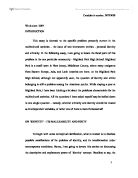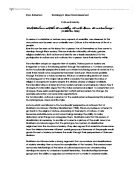In this paper I will discuss the formation of personal identity socially, historically and economically. I will then conclude with an overview of how personal identity has been influenced by this perspective of social sciences.
Name: Gbemisola Agboola, T-number: T2188386, Programme: FCBLSS, 2 term, Module: FC005- introduction to social sciences, Title: the formation of personal identity.
TOPIC: THE FORMATION OF PERSONAL IDENTITY
MODULE: FC005-INTRODUCTION TO SOCIAL SCIENCES
MODULE TUTOR: RIHANNON FIRTH
T-NUMBER- T2188386
STUDENT NAME: GBEMISOLA AGBOOLA
The Stanford encyclopedia of philosophy (2008) states that personal identity deals with questions that arise about ourselves by virtue of our being people. Questions such as what am I? When did I begin? And what will happen to me when I die? The Queensland government also states that “Personal identity is the way in which a person defines themselves in terms of their individuality and difference to others. This might include factors such as age, gender, nationality, culture, religious affiliation, disability, sexuality, interests, talents, personality traits, and family and friendship networks. The way in which a person sees themselves in relation to those around them, and what makes them unique, are all aspects of personal identity”. In this paper I will discuss the formation of personal identity socially, historically and economically. I will then conclude with an overview of how personal identity has been influenced by this perspective of social sciences.
To understand personal identity further questions such as those stated above need to be answered. An individual answers such questions to know where he or she stands in life. To decipher the personal identity the person has adopted and to evaluate the kind of person he or she is. As stated earlier personal identity can be formed or influenced economically, socially or historically. Firstly I will discuss how personal identity can be formed socially. A person’s personal identity socially can be called their social identity which refers to the way they act within social groups such as the family or the community. The Queensland government also states “How we see ourselves in relation to our social groupings defines our social identity.” Social identity formation begins from the birth of an individual into a family. This individual acquires or inherits traits from members of their family and this becomes the foundation of who they are and who they will be known to be. The social identity theory developed by Henri Tafjel (1979) states that “Social identity theory proposes that the membership of social groups and categories forms an important part of our self concept. Therefore when an individual is interacting with another person, they will not act as a single individual but as a representative of a whole group or category of people. Even during a single conversation an individual may interact with another person both on a personal level and as a member of a particular group. This show that an individual’s personality can be moulded by what kind of people he or she interacts with and what kind of people he or she was brought up by. In today’s world though, more individuals are starting to develop more abstract personal identities as the smallest social







